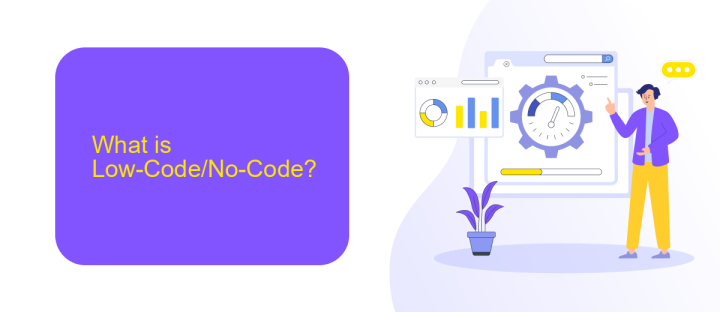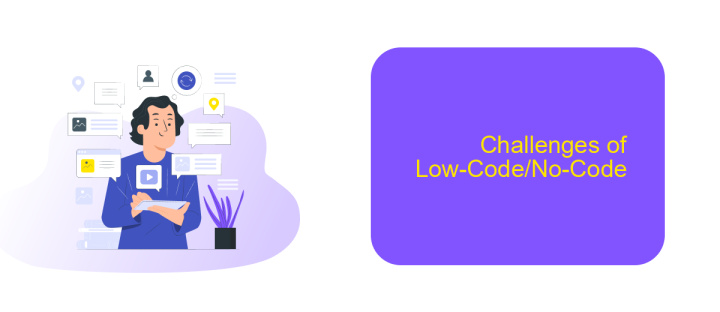Low-Code No-Code App
In an era where digital transformation is paramount, Low-Code No-Code (LCNC) platforms are revolutionizing the way applications are developed. These user-friendly tools empower individuals, regardless of their technical expertise, to create robust software solutions quickly and efficiently. This article explores the benefits, challenges, and future prospects of LCNC technology in democratizing app development for businesses and hobbyists alike.
Introduction
In today's fast-paced digital world, businesses and individuals alike are seeking efficient ways to develop applications without the need for extensive coding knowledge. Low-Code and No-Code platforms are emerging as powerful solutions to this challenge, enabling users to create functional applications quickly and with minimal technical expertise.
- Accelerated development process
- Reduced costs and resource requirements
- Enhanced collaboration between technical and non-technical teams
- Greater flexibility and adaptability
One of the key advantages of these platforms is the ability to integrate various services seamlessly. Tools like ApiX-Drive facilitate these integrations by allowing users to connect different applications and automate workflows effortlessly. As a result, businesses can streamline operations and improve efficiency without the need for complex coding or technical know-how.
What is Low-Code/No-Code?

Low-Code/No-Code platforms are revolutionizing the way businesses develop applications by significantly reducing the need for traditional coding. These platforms provide intuitive visual interfaces and pre-built modules, enabling users to create complex applications through simple drag-and-drop actions. This democratizes app development, allowing non-technical users to build, customize, and deploy applications quickly and efficiently.
One of the significant benefits of Low-Code/No-Code platforms is their ability to integrate with various services seamlessly. For instance, ApiX-Drive is a powerful tool that facilitates the integration of different applications and services without requiring extensive coding knowledge. By using ApiX-Drive, businesses can automate workflows, synchronize data, and enhance productivity, all while minimizing the technical barriers traditionally associated with software development. This ease of integration further amplifies the value of Low-Code/No-Code platforms, making them an attractive option for organizations looking to innovate rapidly.
Benefits of Low-Code/No-Code

Low-code and no-code platforms offer a range of benefits that make them increasingly popular among businesses and developers. These platforms enable users to create applications with minimal coding knowledge, significantly reducing development time and costs.
- Speed of Development: These platforms allow for rapid prototyping and deployment, accelerating the overall development lifecycle.
- Cost Efficiency: By reducing the need for extensive coding, businesses can lower their development costs and allocate resources more effectively.
- Accessibility: Non-technical users can create and modify applications, democratizing the development process and fostering innovation.
- Integration Capabilities: Services like ApiX-Drive facilitate seamless integration with other tools and platforms, enhancing the functionality of low-code/no-code applications.
- Flexibility: These platforms offer a variety of templates and modules, allowing for customization to meet specific business needs.
In summary, low-code and no-code platforms empower organizations to innovate quickly and cost-effectively. By leveraging tools like ApiX-Drive for integrations, businesses can further enhance their applications' capabilities, making these platforms a strategic asset in the digital transformation journey.
Challenges of Low-Code/No-Code

While Low-Code/No-Code platforms offer numerous benefits, they also come with their own set of challenges. One significant issue is the limitation in customization. These platforms often provide predefined templates and modules, which can restrict developers from creating highly specialized applications.
Another challenge is the potential for scalability issues. As businesses grow, the applications built on Low-Code/No-Code platforms may struggle to handle increased data loads and user traffic. This can result in performance bottlenecks and require substantial rework.
- Limited customization capabilities
- Scalability concerns
- Vendor lock-in risks
- Security vulnerabilities
Additionally, integrating these applications with existing systems can be complex. Utilizing services like ApiX-Drive can help streamline this process by offering automated integration solutions. However, reliance on third-party services introduces another layer of dependency, which can be problematic if the service experiences downtime or other issues.
Future of Low-Code/No-Code
The future of Low-Code/No-Code platforms is incredibly promising, as they are set to revolutionize the way businesses and individuals create software. These platforms lower the barrier to entry, allowing non-technical users to develop applications quickly and efficiently. As technology continues to evolve, we can expect these tools to become even more intuitive and powerful, incorporating advanced features like AI-driven development and more robust customization options. This will enable users to create highly sophisticated applications without the need for extensive coding knowledge.
Integration capabilities will also play a crucial role in the evolution of Low-Code/No-Code platforms. Services like ApiX-Drive will become increasingly important, as they allow users to seamlessly connect various applications and automate workflows without writing a single line of code. This not only enhances productivity but also ensures that different systems can work together harmoniously. As more businesses adopt these platforms, the demand for such integration services will continue to grow, further solidifying the role of Low-Code/No-Code in the future of software development.
FAQ
What is a Low-Code No-Code app?
Who can benefit from using Low-Code No-Code platforms?
Can Low-Code No-Code platforms handle complex integrations?
Are Low-Code No-Code apps secure?
What types of applications can be built using Low-Code No-Code platforms?
Routine tasks take a lot of time from employees? Do they burn out, do not have enough working day for the main duties and important things? Do you understand that the only way out of this situation in modern realities is automation? Try Apix-Drive for free and make sure that the online connector in 5 minutes of setting up integration will remove a significant part of the routine from your life and free up time for you and your employees.

